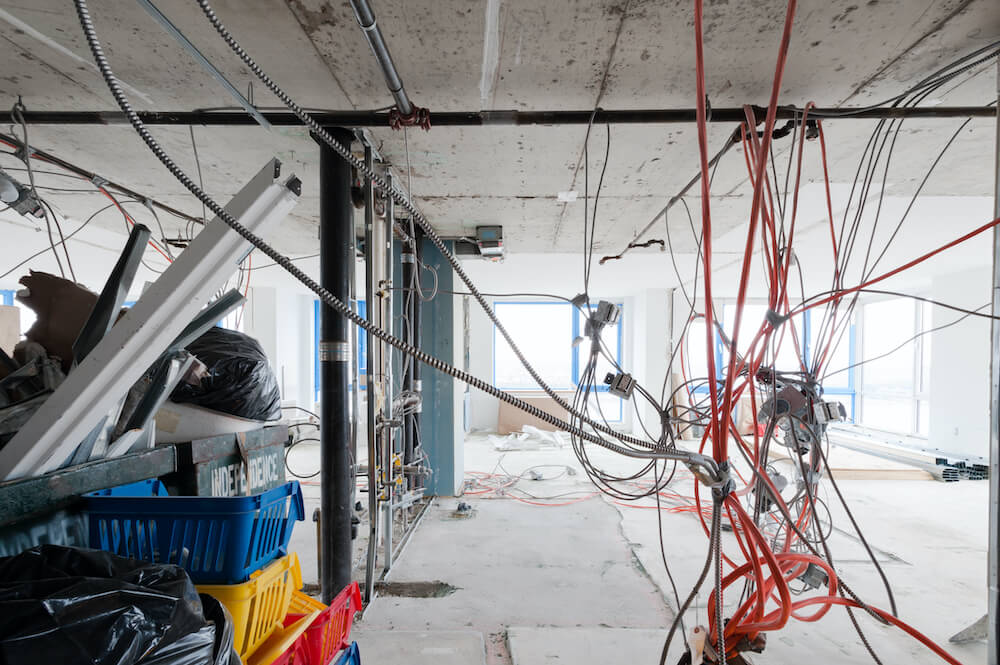Home / Blog / Home Renovation Process
Your Ultimate Guide to Hiring Home Remodeling Contractors in the US
Your home renovation project deserves the best. But navigating the world of remodeling contractors can be stressful. This guide will equip you with the knowledge and resources to confidently hire the perfect contractor for your needs. Sweeten connects you with top-rated professionals, simplifies the process, and ensures a smooth and successful remodel.
- What is a general contractor for home renovation?
- What makes a great general contractor?
- Traditional general contractors vs design-build contractors
- How much does remodeling cost in the US?
- Why hire a qualified general contractor for your project?
- Who should I hire for my home renovation?
- How to hire a general contractor in your city
- How Sweeten connects you with top contractors
Post your project on Sweeten for free and make your dream renovation a reality. Sweeten simplifies home renovation by connecting homeowners with top-rated general contractors, handling the vetting process and project management. To learn more about how we can help, check out our home renovation services.
What is a general contractor for home renovation?
General contractors play a pivotal role in overseeing major construction and remodeling projects. Referred to as contractors or “GCs,” they serve as the primary professionals responsible for managing every aspect of the project. These contractors are entrusted with tasks such as sourcing materials, securing permits, and ensuring that the project adheres to the specified plan. They manage subcontractors, tradespeople, vendors and workers. They liaise with other stakeholders, such as architects, designers, and condominium or cooperative boards, as needed. The term “general contractor” encompasses both individual professionals and contracting companies, which vary widely in size and structure. These companies range from small-scale operations with one or two individuals to mid-sized firms with 10-20 employees, and even large corporations with 50 employees or more.
What makes a great general contractor?
Selecting the right general contractor is pivotal for the success of any construction or remodeling project. Distinguishing between good and exceptional contractors requires a deeper understanding of the qualities that set them apart. Core attributes indicative of excellence in general contractors include open and honest communication, adaptive agility, keen attention to detail, and unwavering commitment to organization.
Open Communication and Realistic Expectations
A skilled general contractor in New York City excels at transparent communication and setting realistic expectations. They understand the unique challenges of urban construction, including city regulations, tight spaces, and busy schedules. By effectively conveying potential obstacles, they ensure clients are well-informed and prepared for the project. Honesty about budget limitations is paramount, and they collaborate closely to develop realistic scopes of work that align with both budget and timeline constraints.
Adaptive Agility
Top-tier contractors demonstrate adaptive agility in the face of unexpected challenges. They approach clients with innovative solutions and flexibility, navigating the complexities of urban construction while maintaining project momentum. Their ability to think quickly and creatively is a valuable asset in ensuring a successful outcome.
Meticulous Attention to Detail
A reputable contractor takes pride in their high-quality workmanship. They meticulously inspect every aspect of the project, identifying and addressing imperfections promptly. This attention to detail ensures that the final result exceeds client expectations.
Respect for Tidiness
A reliable general contractor prioritizes protecting clients’ homes and belongings throughout the construction process. They outline clear plans for maintaining cleanliness and minimizing disruptions in their estimates and contracts. This commitment to tidiness ensures clients feel confident and comfortable throughout the project duration.
At Sweeten, our decade-long expertise in vetting and collaborating with general contractors sets us apart. Our rigorous 7-step contractor vetting process ensures that our partner contractors possess the extra edge and a proven track record of satisfied clients.
Traditional general contractors vs design-build contractors
A traditional general contractor manages the construction process, including procuring materials and hiring subcontractors. Some traditional contractors may also offer creative solutions or very basic design services, but the level of input varies from firm to firm.
A design-build company, on the other hand, is a company that takes responsibility for both the design and construction of a project. They typically have in-house architects, designers, and construction experts that work together to create the plans and then carry out the construction. This is often the most efficient option when architectural design services are required.
At Sweeten, we partner with a wide array of contractors across the United States, ranging from traditional build-only contractors to full-service design-build firms. Whether you’re seeking a simple renovation or a complete design-build solution, we’re here to meet your needs! Simply post your project to start connecting with our network of trusted contractors today.
How much does remodeling cost in the US?
A combination of factors influences remodeling costs across the United States, including service level, contractor experience, and regional variations in pricing. General contractors typically derive their income from service fees, which may encompass commissions or markups on materials and labor expenses. Additional charges for project management or specialized services may also apply. The contractor’s fee structure, whether a fixed rate or a percentage of the total project expenditure, is typically negotiated with the client before commencement.
At Sweeten, we’re experts at all things general contractors. Here’s how Sweeten works: We pre-screen them for our network, carefully select the best ones for your remodeling project, and work closely with hundreds of general contractors every day.
We have an extensive library of remodeling cost guides to help you plan your project budget, plus hundreds of additional renovation process and planning guides. Below are a few of our most popular guides:
When hiring a general contractor, homeowners often focus on transformative projects involving multiple trades, which is why these professionals are typically sought for projects that cost $15,000 and up. For example, in Los Angeles, California, common remodeling projects range from modernizing kitchen and bathroom spaces to expanding outdoor living areas. Contractors in this region often adjust their pricing to accommodate the area’s high demand and competitive market. Across the nation in Atlanta, Georgia, popular remodeling projects include updating kitchen layouts and renovating historic homes, with contractors offering competitive pricing options tailored to the city’s diverse architectural styles and homeowner preferences.
We understand the significance of transparent pricing and informed decision-making for homeowners nationwide. That’s why we provide an extensive array of remodeling cost guides tailored to assist you in budgeting for your project. Also, explore our comprehensive collection of renovation processes and planning resources to gain insights into the nuances of remodeling across different regions. Some of our most sought-after pricing guides cover a spectrum of projects, from kitchen remodels to full home renovations, ensuring you’re well-equipped to make informed decisions regardless of your location.
Why hire a qualified general contractor for your remodeling project?
A home renovation project is an exciting adventure, but it’s vital to approach it with caution, especially when considering DIY or hiring unqualified contractors. Here’s why remodeling without a qualified contractor across the US poses significant risks:
Inferior workmanship: Your dream renovation deserves top-notch craftsmanship. However, DIY projects or inexperienced contractors may not deliver the quality and precision required. From uneven paint jobs to improperly installed fixtures, subpar workmanship can lead to costly and time-consuming fixes later on.
Code violations: Each state has its own set of building codes and regulations, and navigating them without expertise can be risky. For example, in New Jersey, failure to comply with the regulations set by the Department of Community Affairs (DCA) can result in serious consequences. DIYers or unqualified contractors may inadvertently overlook or misinterpret these rules, risking non-compliance. Ensuring your renovation meets all regulatory requirements is crucial to avoid legal troubles and additional expenses.
Liability risks: Safety should be a top priority during renovations. If accidents happen on-site, uninsured or inexperienced workers could leave you liable. From injuries to property damage, the financial implications of accidents can be significant. Working with qualified and insured contractors mitigates these risks and provides peace of mind.
Delays and cost overruns: Accurate estimates and thorough planning are essential for staying within budget and timeline. DIYers or unqualified contractors may encounter delays, unexpected costs, and budget overruns due to unforeseen issues or lack of experience. These challenges can strain finances and cause stress.
Across many states like California, New York, and New Jersey, stringent regulations govern home renovations. In other states, like Texas, Florida, Georgia, the rules for renovating may be looser. In either scenario, partnering with a trusted general contractor ensures you’ll have access to the invaluable expertise needed to navigate the complexities of the renovation process safely and effectively. Qualified contractors can offer advice and guidance to identify potential issues before they escalate, ensuring a smooth and stress-free renovation journey. Sweeten brings homeowners an exceptional renovation experience by personally matching trusted general contractors to your project, while offering expert guidance and support—at no cost to you. Renovate to live, Sweeten to thrive!
Who should I hire for my home renovation?
Choosing the right team for your home renovation is paramount to the success and safety of your project. With numerous options available, from DIY enthusiasts to qualified contractors, navigating this decision can be overwhelming. Understanding the risks associated with remodeling without a qualified contractor is essential. From inferior workmanship to legal liabilities and budgetary concerns, the consequences of choosing the wrong professionals can be significant. In this guide, we’ll explore the importance of hiring qualified contractors for your home renovation, highlighting the expertise they bring and the benefits they offer in ensuring a smooth and successful project.
When you should hire an architect
You’ll need an architect if any of the following apply to your renovation:
- Changing the layout, making additions, or tearing down walls
- Moving plumbing lines such as bathtub or dishwasher
- Moving gas lines
- Doing work on a landmark property
- Any changes that require approval from the Department of Buildings

When you should hire a general contractor
Hiring a general contractor may best suit your job if none of the above apply to your renovation. You would also have a general idea of what you’d like to do with the space. Post your project at Sweeten where most contractors can give some guidance on design, materials, and creative solutions for tackling challenges. Alternatively, you can also request a design-build firm.
NOTE: A remodeling contractor who is licensed ensures that the necessary level of checkpoints and screening processes have been met. More on this below.
When you should hire an interior designer
If walls and room functions are not being altered dramatically, an interior designer can help with things like:
- Considering overall traffic flow, lighting, and space planning
- Designing custom built-ins and cabinetry
- Project management and purchasing of materials, fixtures, and appliances
- Choosing furniture styles, color palette, and finishes
How to hire a general contractor in your city
You’ve come to the right place—helping people hire the right contractor for their remodeling project is exactly what we do at Sweeten! Here’s a breakdown of the process.
Source 3-5 contractors who are fit for the job
Finding qualified general contractors in the US can be a challenge. You’ll want to research and narrow down a handful of contractors with the right experience, who work in your area, provide the services you need, fit within your budget, and are available and interested in the job. While you could start by asking friends or researching online, if you’re in one of Sweeten’s service areas, we highly recommend saving yourself the legwork and meeting trusted contractors on Sweeten!
Hold Site Visits
Schedule separate meetings at your project site with each of the contractors you’re considering. This is your chance to learn more about their firm and evaluate how well you think you’d work together. Come prepared with questions! (Hint: we’ve provided a list below.)
Collect Estimates
After your site visits, each contractor should prepare an estimate, or bid, for your project. This process typically takes 1-2 weeks, as contractors coordinate with their subcontractors to prepare the document.
Compare the Bids
Contractor estimates may vary, making it essential to review each bid thoroughly. While there’s no standard form for estimates, you’ll need to evaluate what is and isn’t included in each bid. This is a critical decision-making stage, which is why we offer a free bid-leveling call to help you make the best hiring choice for your project.
Conduct Negotiations
Once you’ve narrowed down your choices, discuss any adjustments or tweaks you’d like to make to the proposal before committing.
Sign a Contract and Pay Your Deposit
Finalize the deal with a formal contract and deposit, allowing the contractor to begin acquiring necessary materials ahead of your agreed-upon start date. Sweeten offers secure, electronic deposits when you sign with a contractor, making the process more convenient for you.
Sample questions to ask at your site visits
- How long have you been a general contractor?
- How many projects have you managed simultaneously? How many do you plan to manage while working on my project?
- Are you familiar with the local building codes and regulations?
- Who will be in charge of my project and who will be working on it?
- How will you handle any unexpected challenges, delays, or changes during the project?
- What is your policy for communication and updates during the project?
- What potential challenges could you foresee with my project?
- How do you plan to protect my home during the course of my renovation?
- How does your payment schedule work?
- What is your insurance coverage?
- Do you provide a warranty for your work?
- Do you have references from previous clients?

How Sweeten connects you with top contractors
At Sweeten, our mission transcends city limits—we’re dedicated to facilitating seamless home transformations for homeowners across the United States, empowering you to turn your living spaces into personalized sanctuaries. With over 3,000 successful renovations nationwide, we’ve fine-tuned our approach to add unparalleled value to your renovation experience, and the best part? It’s all at no cost to you. Here’s how we elevate your renovation journey:
Thoroughly vetted, trusted general contractors: We understand the significance of entrusting your project to reliable professionals. That’s why we meticulously vet and partner exclusively with contractors who boast a proven track record of excellence. Be assured, the professionals we recommend are committed to delivering top-tier workmanship and service, regardless of your location.
Carefully selected contractors for your unique project: Recognizing the individuality of every renovation endeavor, our team handpicks contractors tailored to your specific needs, no matter where you are in the country. Whether it’s a chic kitchen transformation in New York City or a rustic farmhouse renovation in rural Texas, we’ve got the perfect match for your project.
Competitive bidding process for fair pricing: Transparency is paramount in the renovation process. Hence, we provide a platform for competitive bids from our network of contractors, ensuring you receive fair and market-driven pricing, irrespective of your location. Armed with clear insights into your options, you can confidently make informed decisions about your investment, no matter where you call home.
Guidance through the decision-making process: We understand the weight of choosing the right contractor, regardless of whether you’re in the heart of a bustling city or nestled in a quiet suburb. That’s why we offer personalized bid-leveling calls with our team members, providing invaluable insights and guidance to homeowners nationwide. Navigate the complexities of contractor selection with confidence, armed with expert advice every step of the way.
Peace-of-mind from start to finish: From coast to coast, Sweeten is your unwavering support system throughout the renovation journey. Whether you’re planning a project in the urban jungle or the tranquil countryside, our wealth of knowledge and experience ensures a smooth and successful renovation process. Leave the stress behind and embark on your renovation journey with confidence, knowing that Sweeten has your back, no matter where you are in the US.
Ready To Get Started?
Post your project on Sweeten for free and make your dream home a reality. Sweeten puts you in control of your renovation, from finding the perfect contractor and gathering design inspiration, to using cost guides to plan your budget wisely.
FAQs about hiring general contractors in the US
Before hiring a general contractor, it’s essential to assess your renovation needs, establish a budget, and research potential contractors thoroughly. Look for experienced professionals with a track record of successful projects.
After posting your renovation project on Sweeten (for free), you can review proposals and pay attention to details such as project scope, timeline, budget breakdown, and warranty information. Look for comprehensive proposals that address your specific renovation needs, budget, and terms.
Yes, Sweeten offers access to qualified general contractors for hire in many locations including Manhattan, Brooklyn, Queens, the Bronx, Staten Island and more, ready to assist with your renovation needs.
At Sweeten, we collaborate with a diverse range of contractors nationwide, spanning from conventional build-only professionals to comprehensive design-build firms. Whether you’re envisioning a straightforward renovation or a fully integrated design-build approach, we’re equipped to fulfill your requirements! Get started by posting your project and seamlessly connect with our network of dependable contractors today
When comparing quotes from various general contractors, it’s essential to look beyond the bottom line. Evaluate the scope of work outlined in each proposal, ensuring that they cover all aspects of your project and are detailed and transparent. Pay attention to the quality of materials and finishes specified, as well as the proposed timeline and payment schedule. Consider any additional services or warranties offered by each contractor. Ultimately, prioritize value over solely focusing on the lowest price, as selecting a contractor based solely on cost can lead to compromises in quality and service.
A general contractor is a person or company responsible for overseeing and managing a construction project. They handle all aspects of the project, from securing permits and hiring subcontractors to scheduling work and ensuring quality standards are met. Essentially, they act as the main point of contact for the client, coordinating all the necessary trades and ensuring the project is completed on time and within budget.













